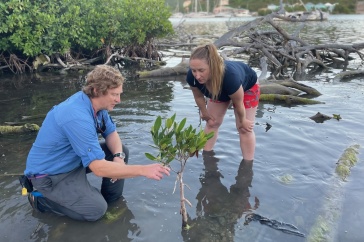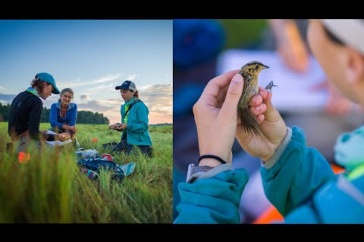
Emma Gootee, a sophomore in the biological sciences program, presented her research on mild traumatic brain injury at the Cognitive Aging Conference in Atlanta on April 15. Her study is titled "Premature return to normal activity following mild traumatic brain injuries throughout the lifetime of healthy college students."
Gootee, a 2013 graduate of Saint Thomas Aquinas High School, presented her research alongside students and researchers from Ivy League schools around the world.
"Emma was surprised to be presenting next to people from Harvard, Johns Hopkins University School of Medicine and international universities as well," said Daniel Seichepine, lecturer of neuropsychology and the faculty sponsor for her research. "It was a tremendous growth experience for her."
Gootee said her research on the lasting effects of mild traumatic brain injury has a personal significance.
“As someone who has suffered multiple concussions, I know what it's like to take your treatment plan lightly,” Gootee said. “I really want to make a difference in people's lives and help better their long-term outcomes.”
Gootee was one of very few undergraduates who presented at the conference, which she said was incredible. She and Seichepine are now working on getting their research published, and hoping to further it by intervening in people’s real-life concussion treatment.
“I wanted to do this research to make me a better med school candidate, as I want to go on to become a neurosurgeon; but I really want to pursue it because of a genuine passion for learning and for being challenged,” Gootee said.
Article Abstract
Exposure to mild traumatic brain injury (mTBI; also known as concussion) is associated with the development of cognitive problems in later life. To mitigate the effects of these injuries, current treatment protocols recommend that individuals rest until completely asymptomatic before returning to normal activity. However, the proportion of individuals who return to normal activity too early is unknown. Therefore, the present study examined how often injured individuals return to normal activity following mTBI.
Eighty-four undergraduate students ranging from 18-40 years old (mean = 22.2; SD = 4.3) participated in an anonymous survey (Female = 75%) assessing frequency and treatment of lifetime mTBIs. Participants were asked to report for how many mTBIs did they return to normal activity before asymptomatic. A definition of mTBI consistent with the American Academy of Neurology's current guideline was used. Of the eighty-four participants, fifty-five reported experiencing at least one mTBI (range = 1-7) in their lifetime, with 59% being formally diagnosed. A chi-square goodness of fit test indicated that the proportion of times individuals returned to normal activity before asymptomatic was not equally distributed (x2 = 22.8, p < .001). Of the 128 concussions reported, individuals returned to normal activity before asymptomatic 71% of the time.
Experiencing a mTBI has been associated with long-term cognitive problems. Present findings suggest that the majority of individuals return to normal activity before they return to baseline. Based on these findings, it is plausible to suggest that, with proper rest, long-term cognitive problems could be minimized.





















































